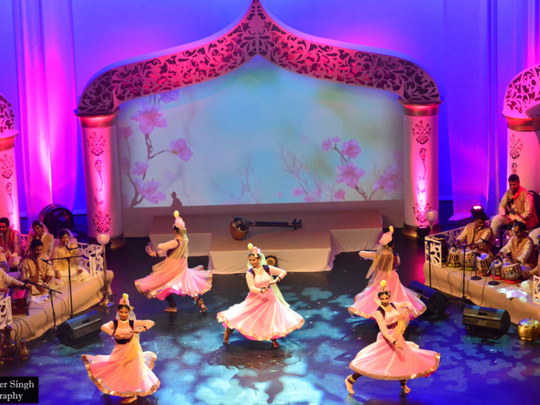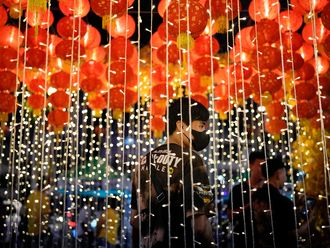
Malhaar, the UAE’s first Indian ensemble, will present “Jashn-e-Awadh: A Unique Musical Journey to the Land of Nawabs”, tonight and tomorrow at DUCTAC, Centrepoint Auditorium, Mall of the Emirates, Dubai. The concert, featuring more than 50 performers, brings alive the golden era of music, dance and poetry that flourished during the rule of Wajid Ali Shah, the last nawab of Awadh (present day Lucknow in North India). The show also marks the launch of the Malhaar Centre for Performing Arts (MCPA) that will offer training in Indian classical vocal and instrumental music and dance.
Malhaar is a non-profit musical group launched in 2009 by Dubai-based musician Jogiraj Sikidar to bring together UAE residents who share a love of Hindustani classical music. Over the years it has grown into a forum for all art lovers, including composers, writers, stage designers, visual artists, dancers and actors. Most of the group’s 150 members are working professionals who come together in their spare time to pursue their passion for the performing arts.
Video: Malhaar Choir backstage tour
Since its inception Malhaar has presented several concerts that celebrate the rich art and culture of the Indian subcontinent. “Jashn-e-Awadh”, one of the group’s most memorable productions, was first staged in 2011. “We decided to revive this show because of popular demand and because there is so much scope to further explore the cultural legacy of Awadh. ‘Jashn-e-Awadh 2.0’ is a bigger, more spectacular production with many new elements, including original musical compositions and innovative visual effects created with the help of five large LED screens that recreate the grandeur of the nawab’s court,” Sikidar says.
Wajid Ali Shah is remembered as a degenerate ruler who neglected his responsibilities of governance to spend most of his time with dancing girls and at mushairas (poetry-reading sessions), and ultimately gave up his kingdom to the British without a fight. But the show highlights the lesser known fact that the nawab was a gifted poet, playwright, dancer and musician whose patronage and active participation revived the classical Indian dance form of kathak and took the classical music styles of thumri and ghazal to new heights.
“During his reign, Awadh flourished as a centre of art and culture and the city of Lucknow still enjoys that reputation. Our show focuses on this cultural legacy, and showcases the various facets of the Lucknow gharana (school of art) from which emerged many famous dancers and musicians,” Sikidar says.
The show is presented as an interaction between a young musician and a tourist guide from Lucknow who helps him to discover the musical and cultural legacy of the nawab and bridge the gap between past and contemporary Indian music. It depicts different facets of the nawab’s life by recreating the music, poetry and dancing sessions in his court, and celebrations of Indian festivals such as Holi, in which the secular-minded nawab participated enthusiastically.
“Our aim is to transport the audience to that golden era of Hindustani music and dance. The show’s music includes authentic Lucknow gharana dadra, thumri, ghazal, qawwali, bandish and kathak that we have adapted in Malhaar’s choral style. Somdatta Basu, the show’s music co-director, has incorporated compositions and poems from the nawabi era that she has learnt from her guru, kathak legend Pandit Birju Maharaj whose grandfather Bindadin Maharaj was one of the gems of Wajid Ali Shah’s court. We have also adapted traditional Indian festival songs in the Lucknow gharana style. We will present improvisations of the Lucknow bandish ki thumri in the bol-baant technique of splitting lyrics into rhythmic patterns and combination of words; and signature Lucknow thumris will be rendered as independent musical presentations, complimented by kathak performances. The finale will feature the most famous thumri from that era, ‘Babul Mora Naihar Chhooto Hi Jaye’, written and composed by the nawab himself to express the pain of leaving his people and going into exile,” Sikidar says.
Malhaar is using the occasion to announce the launch of MCPA, which will be the first cultural hub in the UAE to offer training in all forms of classical Indian performing arts, namely Indian classical music (sangeet), instrumental music (vaadya) and dance (nritya). Students of all ages and skill levels will be mentored and nurtured by acclaimed practitioners in the age old guru-shishya tradition. The Centre will also invite legendary Indian performers to conduct workshops and give live performances for art lovers in the UAE. It also plans to hold innovative sessions such as a combination of music and yoga for health, and joint lessons for parents and children where they can bond through music. Other cultural initiatives on the anvil include the establishment of Classic Club, a members-only club for performing arts aficionados; monthly jam sessions, titled Whitelight Unplugged, under the moonlight; customised musical retreats in exotic locations, led by celebrity performers; and themed concerts featuring homegrown UAE-based talent.
Event details
Jashn-e-Awadh: A Musical Journey to the Land of Nawabs
When: September 30 at 7.30pm; October 1 at 3.30pm
Where: Centrepoint Theatre, DUCTAC, Mall of the Emirates, Dubai
Language: Hindi and Urdu
Duration: 120 minutes
Tickets: Dh500, Dh250, Dh100 and Dh75; available at DUCTAC box office and Platinum List; or call +971 4 3414777/ +971 55 1013652
For more information, write to malhaar.choir@gmail.com
Jyoti Kalsi is an arts-enthusiast based in Dubai.












